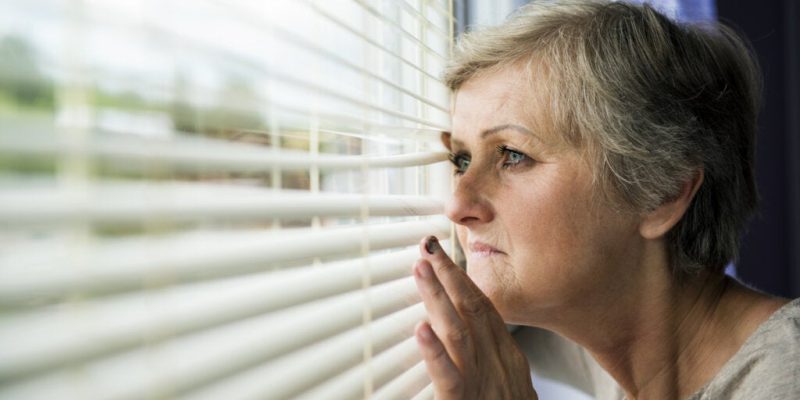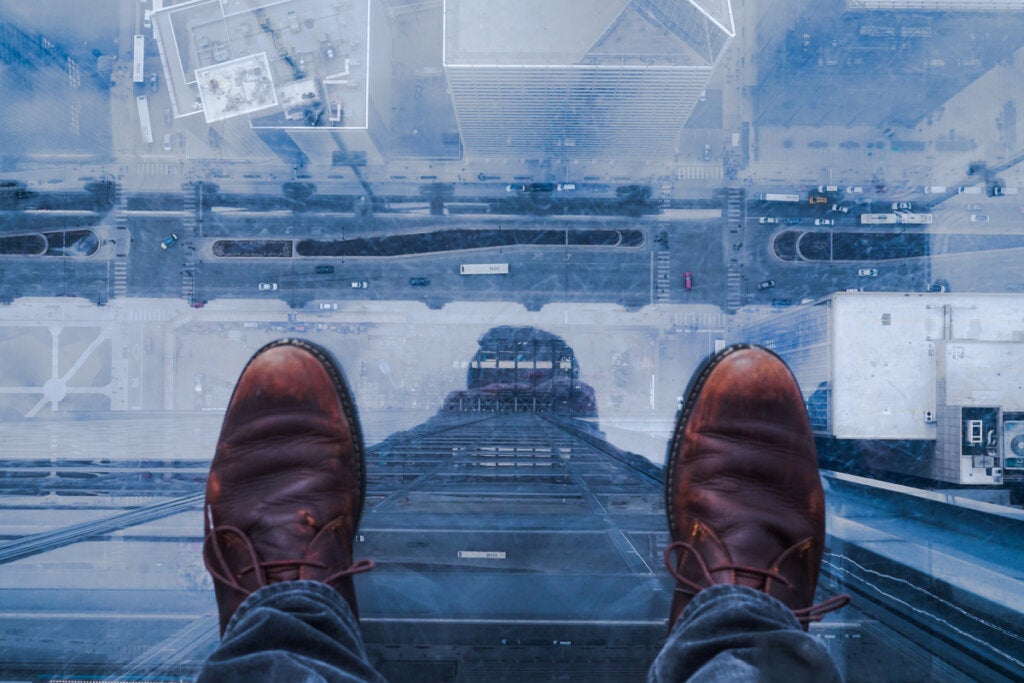There are many different types of specific phobias. They’re phobias concerning a specific object or situation. One such phobia relates to meteorological phenomena. For example, sufferers might be afraid of lightning and thunder, both in the distance and nearby. Or, they may be afraid of thick fog in which visibility is reduced to a minimum.
As a rule, people who suffer from a meteorological phobia have experienced adverse weather situations that have marked their life history. Therefore, the idea that a similar event could be repeated causes them to suffer.
Weather phobias
Individuals suffering from weather phobias experience high levels of anxiety along with an irrational and excessive fear of exposure to or anticipation of certain weather conditions. For this reason, they try to avoid, as far as possible, any situations or places where they may occur.
This type of phobia, like any specific phobia, has the following characteristics :
- The specific object or situation almost always causes immediate fear or anxiety in the sufferer.
- They actively and persistently avoid the feared situation for six months or more.
- The fear or anxiety they experience is out of proportion to the actual danger posed by the object or situation.
- They experience impaired social, occupational, or other important areas of functioning.
- Their symptoms can’t be explained by another psychiatric disorder. For instance, obsessive-compulsive disorder (OCD), post-traumatic stress disorder (PTSD), separation anxiety disorder, or social anxiety disorder.
The exact etiology of weather phobias isn’t known. However, it’s believed that they may develop due to the association between weather conditions and fear or panic. The most common theory behind them is classical conditioning. This theory proposes that a phobia is precipitated when a fear or anxiety-provoking event is combined with a neutral event.
Symptoms of weather phobias
Weather phobia can be observed in an individual when:
- They’re excessively fearful of certain weather conditions.
- They avoid situations where they might confront the object of their phobia.
- They feel anxious during the manifestations of certain meteorological phenomena.
The individual with a weather phobia may also experience physical symptoms. For example, heart palpitations, sweating, shortness of breath, chest pain, lightheadedness, chills, nausea, flushing, and tremors.
They may also present certain cognitive symptoms. For instance, negative images and beliefs, beliefs of inability to withstand the feared situation, negative interpretations of physiological reactions, intrusive thoughts, worries, and a state of alarm.
Phobias can trigger a whole series of symptoms that incapacitate the sufferer in various areas of their life such as social, family, work, and intrapersonal relationships.
Types of weather phobias
Next, we’ll look at some specific types of weather phobias:
- Anemophobia. Fear of wind or air currents.
- Acluphobia. Fear of the dark.
- Auroraphobia. Fear of the Northern Lights.
- Brontophobia or Ceraunophobia. Fear of thunder and lightning.
- Eosophobia. Fear of the dawn or daylight.
- Heliophobia. Fear of the sun, sunlight, or any bright light.
- Hydrophobia or aquaphobia. Fear of water.
- Homichlophobia or nebulaphobia. Fear of fog.
- Hygrophobia. Fear of dampness or moisture.
- Lilapsophobia. Fear of tornadoes or hurricanes.
- Meteorophobia. Fear of meteorites.
- Nephophobia. Fear of clouds.
- Noctiphobia. Fear of the night.
- Ombrophobia or pluviophobia. Fear of rain.
- Ouranophobia. Fear of heaven.
- Psychrophobia. Fear of cold.
- Chionophobia. Fear of snow and snowy weather.
- Thermophobia. Fear of heat and hot weather.
- Selenophobia. Fear of the moon.
No matter what type of weather phobia a sufferer has, they can gain the ability to deal with it. Indeed, just as they’ve learned to respond negatively to certain phenomena, they can also learn more adaptive reactions to them.
Treatment
Talking with a mental health professional can help the phobia sufferer manage their fears and anxieties. Exposure therapy and cognitive behavioral therapy are the most effective treatments in these cases.
- Exposure therapy. It focuses on changing the way the individual reacts to the feared situation. Gradual and repeated exposure to the source of the specific phobia and the associated thoughts, feelings, and sensations can help them control their anxiety. Live exposure consists of them making direct contact with the anxiogenic or unpleasant stimulus. The basic idea is to stay in contact with the feared stimulus until their anxiety is reduced.
- Cognitive behavioral therapy. This involves exposure in combination with other techniques for learning ways to see and cope differently with the specific weather condition that’s causing the fear.
- Medications. Exposure therapy is generally successful in treating specific phobias. However, medications can also help reduce anxiety and panic symptoms.

Coping strategies
If you’re suffering from any of these phobias, as well as psychotherapy, you can adopt the following strategies.
- Don’t avoid the kinds of situations that make you fearful. In fact, instead of avoiding them, try to expose yourself to them as often as possible.
- Practice the techniques learned in therapy and work with your therapist to develop a plan in case your symptoms should worsen.
- Seek support in self-help groups.
- Take care of your mental and physical health. Rest well, eat healthily, and try to be physically active every day.
Finally, if phobias aren’t treated, they can significantly affect an individual’s daily functioning. Therefore, if you’re suffering from any kind of phobia and it’s affecting your daily routine and quality of life, you must consult a mental health professional.
The post The Different Types of Weather Phobias and How to Treat Them appeared first on Exploring your mind.



















Comments